Fermented Feed and how to make it is a must! Everyone who has chickens is familiar with the term chicken math. And for those of you just looking at getting chickens, you will soon learn about chicken math.
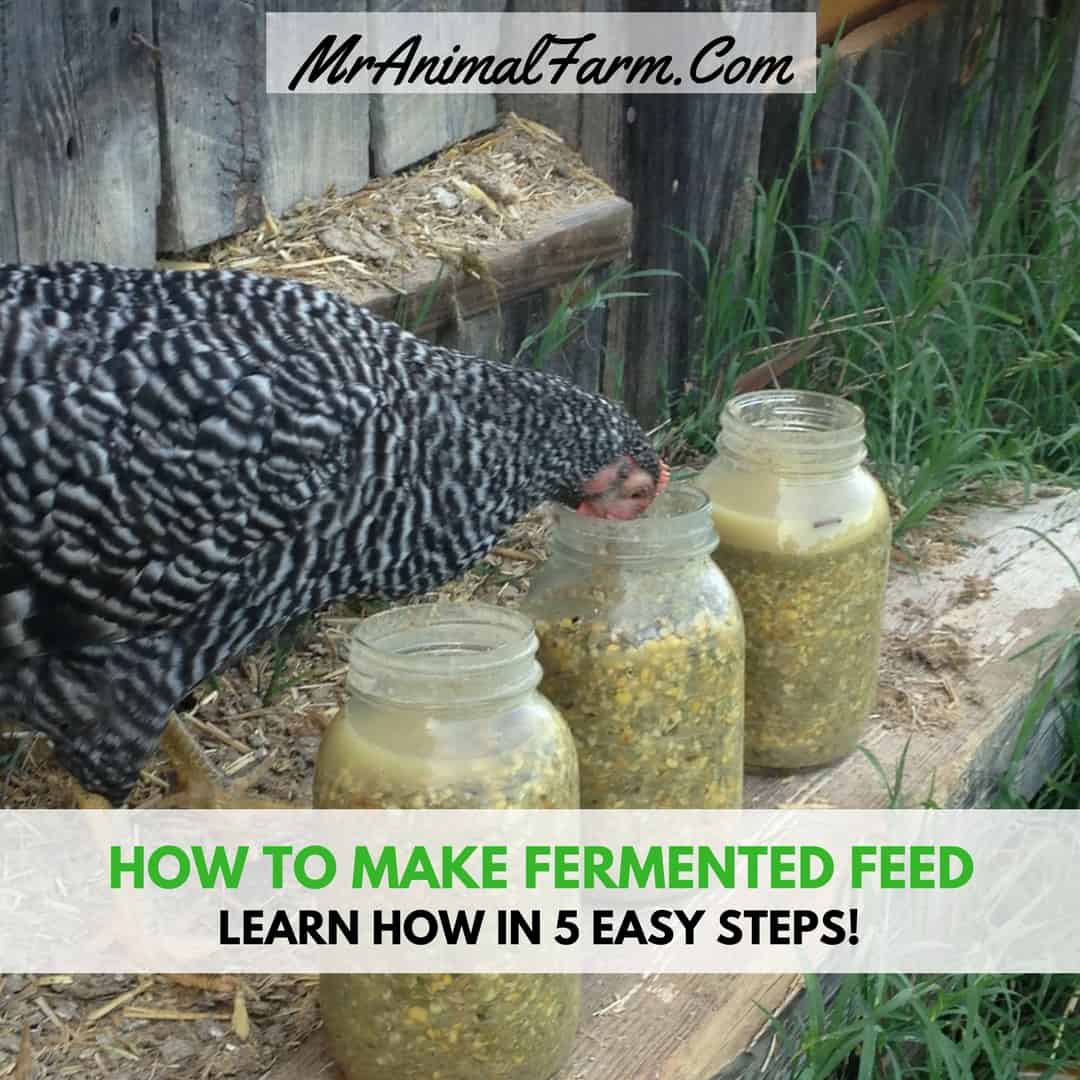
Essentially, most chicken keepers start out with a modest little flock and somehow that flock seems to just exponentially multiply. While chickens, overall, are pretty simple to care for, quickly growing numbers of chickens can cause one yucky consequence - Large Feed Bills!
When we started expanding our flock, we started looking at how to cut chicken feed costs. We buy organic feed and it is not cheap. The cost to feed chickens can lead to quite a bad case of sticker shock.
Our layers already free range, so they get to find themselves lots of extra goodies. They also get garden scraps and some left over food from our meals.
However, the (at the time) flock of 17 was still going through about 3 - 50 pound bags of feed a month. You can figure out how much food your chickens will need a month to figure out your estimated feed cost.
We were just going through way more feed than we wanted to. So, here is where fermented feed entered the picture.
Upon first reading about fermented feed, it almost sounded too good to be true. Not only is it more healthy for the chickens, but they eat less and waste less leading to a decreased feed bill.
It did take a while for us to make the leap to fermented feed because, for some reason, it seemed so complicated to do (it really is not!). We have cut our feed bill in half since starting with fermented feed.
Plus, there are lots of other benefits: there is virtually no waste with chickens scratching the feed out of the feeder, the chickens are able to better digest the feed, their poop seems to be less in amount and grossness, and, did I mention it cut our feed bill in half?!
Need some help keeping your chickens health and care taken care of? Check out the Organized Chicken Keeper for an easy to follow system.
How to Ferment Feed Step-by-Step:
Fermenting feed seemed at first like a big task, but it really isn't. If you are ready to start fermenting, here is a quick how-to:
1) Get your containers
Get some jars or containers to store the feed. We bought 1 gallon pickle jars and emptied them out to have some nice, large glass containers for cheap.
We have since switched to a large 5 gallon food grade bucket. We can make more feed less often and is not as fragile as glass jars.
2) Get a scoop
Get a spoon specifically for the fermented feed. You can use a large cooking spoon or ladle to use. Trust me, the fermented feed can be messy and smelly and you will want a spoon dedicated specifically for this use.
3) Fill your containers
You will put the dry feed into your jar (a canning funnel cuts down on the mess), add water to cover the feed plus an inch or so, stir and cover. The feed will expand....A LOT.
We started with about half the amount of dry feed we usually fed. We did have to adjust amounts a little until we got the right amount.
You don't want the chickens to leave excess feed out, but also don't want them to eat it all and still be hungry. If you keep an eye on them, you should be able to find the right amount after a few feedings.
4) Track the fermentation process
You want to always keep water up over the line of feed, so you may need to add additional water and stir once a day or so. It is important to make a habit of this. If the container goes too long without being opened it can build up too much pressure.
If the container has too much pressure, in the best cases it will start to leak stinky fermented feed juice from under the lid. Worst case, it can crack your jars and create a glass hazard.
5) Set a schedule
We do things on a 3 day rotation. One jar is enough feed for one day - morning and evening feeding. So, as we empty the jars at night, we refill with feed and water. This way, since we have 3 jars, when we use the feed it will have been fermenting for 3 days at the time of use.
If you'd like to see the step-by-step process, check out our YouTube video (and don't forget to subscribe!):
If you need more help with taking care of your chickens, check out The Organized Chicken Keeper for a complete system for managing their health through keeping their supplies stocked and coop clean.

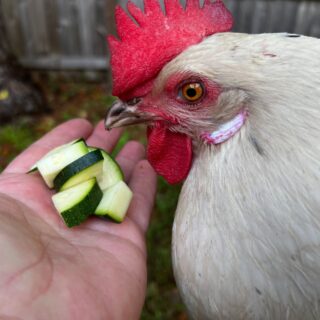
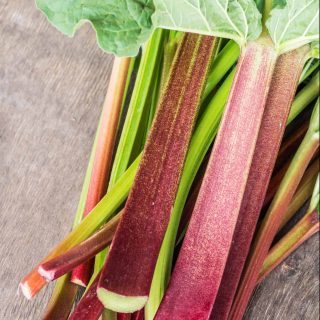
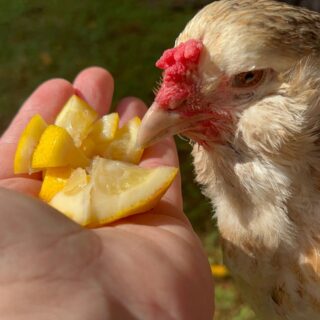
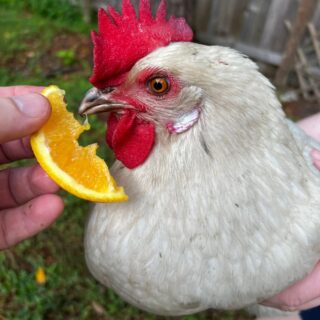
KG says
What about flies. Does the fermented food attract them. Before I put my organic feed under cover and it got wet from S Florida daily afternoon rains the flies would be crazy!!
MrAnimal Farm says
We haven't had any fly issues with ours. But I could see where there could be potential if there was any spilled etc.
Holly says
Can you use typical non organic layer crumbles for this method? We’ll soon be adding our 4 newest chicks to our flock, and cutting back on food costs is a must. Right now we’re feeding them free will, aka fill the feeder and leave it in the coop. How much would be a good starting point for 2 year old Hens? And is this ok for juvenile chicks? They are on chick starter food and almost fully feathered.
MrAnimal Farm says
Hi Holly,
yes you can use the crumbles, but there are not as many benefits - they are already more easily digestable and they do not expand quite the same way. But it does still help provide good bacteria etc through the fermentation process.
Mrs. Ogley says
So, I'm going to go for this. Cutting y chicken feed bill in half sounds fabulous!!! A fellow culturing (human milk & tea) friend lives in MS and she said her fermented chicken food always molded. How can this be avoided in a humid climate? Or did she do something wrong?
MrAnimal Farm says
We have found that if we make sure to keep the water covering the feed and use it within a few days we do not get any mold 🙂
Valeri says
Fermenting is almost a must for ducks & geese (which I raise). First, water fowl (WF) use water to digest their food. In summer, the more water, the better. Second, in winter I add warm water and oatmeal, wheat seeds or grits to their feed which they love. Plus the savings in feed. Amazing. I also grow fodder in my basement in winter. In Summer, my flock is my lawn mower.
Alicia says
Have you noticed any difference in egg production?
I wonder why they eat less of the fermented feed, when you are really just increasing the water content and not the nutrient content. Do they just feel more full but aren't getting all the nutrients that they may need?
MrAnimal Farm says
Hi Alicia,
By fermenting you do a couple of things: 1) it makes the feed more digestable for them, so they can actually get/absorb more of the nutrients. 2) it significantly decreases the waste as they are not scratching a bunch of it out. They eat ALL of it.
So, no difference in egg production 🙂
Best,
Kristin
Jonathan Jones says
What kind of grains/ feed do you ferment?
MrAnimal Farm says
We use organic layer feed. We buy ours from New Country Organics.
Heather says
Are these your traditional pellets? I have ducks and the feed I give them is pellets.
MrAnimal Farm says
This is more like actual grain. But I suppose you can probably do the same with pellets.
Angela says
Hello, how many chickens are you feeding with this 1 gallon pickle jar? Is this amount for your original 17 or was this for more? I have 11 chickens and 2 ducks that I would like to start giving fermented feed to. Can you possibly give me a recommendation as to how much feed to start with for that many birds? Thanks! 🙂
MrAnimal Farm says
We go through the 1 gallon pickle jar in one day now with about 35 birds. However, our girls are also allowed to free range all day long. If they were not free-ranging they would definitely need more feed from us. If yours aren't free ranging you could probably start with 1/2 a gallon twice a day. If they are free ranging, maybe try 1/4 a gallon twice a day to start.
If they fly through it, try adding a little more. If they don't finish it all within 15 - 30mins, then it is too much for them and you can cut it back 🙂
daniela says
hi thanks for you shating this....i was wandering about feeding the chickens ( and ducks, that i have...) with sprouts....what do you think about?
MrAnimal Farm says
Hi Daniela,
We, personally have not tried fodder for our poultry. But from what I have read and heard it can really be good for them (and also help decrease your feed bill). Do you use it? If so, we would love to hear about it.
Thanks,
Kristin
Nakalan McKay says
When you're giving the fermented feed to your chickens, do you put it in a typical food dispenser or do you scatter it on the ground?
MrAnimal Farm says
Hi Nakalan,
We use shallow metal dog bowls like this: http://amzn.to/2gLGreF
We haven't tried it in a regular chicken feeder, but I think it would be difficult for them to get to. Since it is wet, it sticks together some and I don't think that it would dispense properly.
Let us know if you have any other questions!
Thanks,
Kristin